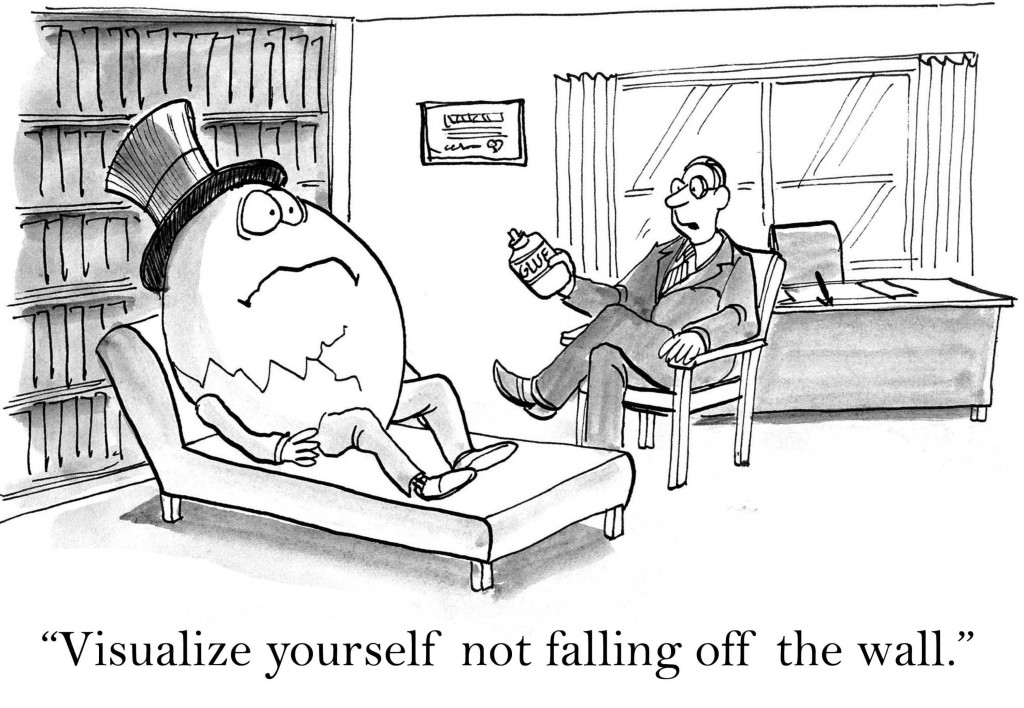While traditional talk therapy can help many people with many types of problems, recent research suggests that it has a massive achilles heal that can cause it to fail you when you need it most.
Researchers at NYU had student volunteers come in and watch a computer screen while they were hooked up to a device that gave them a mild shock whenever the saw a particular picture of a snake or a spider. This procedure causes a pretty big fear response and the students reliably got anxious (they rated they fear as a ‘7’ on a 0-10 scale) whenever they just saw the picture, even when they weren’t shocked. Then the researchers taught the students skills used in a form of talk therapy know as cognitive behavior therapy or CBT – thinking more rationally about the study and the shocks. This worked really well. Even though it didn’t completely remove their fear, it got their fear ratings down from a ‘7’ to a ‘2.’
. . .
The next day they had the students come back and they tested them again – except that there was one change – they had half of the students put their hands in ice water for 3 minutes while the other half put their hands in lukewarm water for 3 minutes. When they tested them again the warm water group maintained all of the gains they made in their ‘therapy’, their fear stayed at the ‘2’ it was before. However, the cold water group had a complete relapse – all of their fear returned – they were right back up to the ‘7.’
. . .
This happens because talk therapy is a top-down approach, it teaches you to use your thinking mind to contain and control your emotional mind. The cold water causes the release of stress hormones that temporarily deactivates the part of your thinking mind that controls your emotions. So since the fear was only inhibited but never eliminated, it came right back when the students were stressed. The problem is that in the real world the time that you need to maintain your gains the most is exactly when you are undergoing stress.
. . .
IMPLICATION
The moral of the story is that talk therapy often works well in reducing and controlling your emotions. But anything that triggers stress hormones, stress at work, marital or financial problems, illness or an operation or just putting your hand in ice water for 3 minutes, can cause a full relapse, the immediate and full return of your symptoms. The same stress-induced relapse is likely to happen even if you don’t go into therapy but just train yourself to ‘put things out of your mind’ or to think more positively about situations in your life. Researchers call this the Return Of Fear, but it can also be the Return of Anger, the Return of Depression or the Return of Guilt.
. . .
This is similar to the way the tuberculosis works, over 80% of people who are exposed to tuberculosis have mild symptoms that disappear quickly or no symptoms at all. Some won’t even have a positive TB text. This is because most people’s immune systems are strong enough to build a little capsule around the TB bacteria, it doesn’t kill the bacteria, but the capsule locks it away and prevents them from causing symptoms. People then go years or even decades feeling completely normal until they have an operation, they are stressed out or their immune system just wears out with age. Then the capsules begin to dissolve and they all of a sudden have full blown TB, which makes no sense to them because it may have happened when they visited that third world country several decades ago. This is called latent TB. The treatment for latent TB is to be put on a full course of medications so that the bacteria is killed inside the capsules, then you can have all the operations and stress that you want to and you won’t have and can’t have a relapse because it was cured at the root.
. . .
Thankfully there are several techniques that can fully resolve the underlying emotions of fear, anger, sadness, guilt, etc., so – just like with TB – when emotional issues are fully resolved at the root you can be in stressful situations and even put your hands in as much ice water for as long as you want to without having a relapse. Achievement Centered Therapy uses a blend of several techniques that are designed to work from the bottom-up instead of from the traditional top-down talk therapy approach, resolving emotional issues at the root.
. . .
FURTHER READING
. . .
. . .
. . .

Leave a Comment